Welcome to today’s installment of Reverent Sundays, where I write about an aspect of my faith. This can deal with recent books I have read on Christianity, my thoughts on religion and current issues, as well as particular messages I find touching and/or powerful. I am aware that most of my readers are not religious, and that is fine — you are more than welcome to not read these posts if they make you uncomfortable, enrage you, or bore you to tears. I am open to debates and discussions in the comments section as long as everyone remains respectful. Enjoy!
I love my children. I am amazed whenever I gaze upon their faces. I take delight in their happiness. And as I have said in the past, becoming a mother is helping me be a better person — and bringing me closer to God.
But, as long-time readers of this blog may know, motherhood has not been easy for me. And never has the doctrine of inherent sin been more clear to me until I had babies and witnessed their little bodies and spirits already be tainted by sin.
But wait — doesn’t Jesus tell us that “whoever does not receive the kingdom of God like a child shall not enter it” (Luke 18:17)? Yes, and this is certainly one of the most-quoted verses of the Bible, and for good reason: we must all embrace Christ with a childlike faith. (See “Like a Child” for a succinct list of qualities of a childlike faith.) But this does not mean that all children are innocent!
We do not teach our children to throw tantrums. We do not teach our children to be selfish. We do not teach our children to hit others, throw objects, or lie (studies show that infants begin to lie as early as 6 months of age!). Yet they do these things without incitement, as if they were ingrained in them from the start.
Non-believers may call these survival instincts, or even just human nature. We call them the by-products of original sin — inherent sin. Because we ALL (even tiny babies!) are sinners and fall short the glory of God.
This may seem a bit harsh, and even discouraging. But I do not see it as so. Instead, I look at my girls — at their imperfections, their sins…and I realize the sheer amount of love that I, as a sinner, have for them and become simply OVERCOME. Because the amount of love that this sinner has for these sinners, knowing that it is IMPERFECT love, makes me grasp just how much more and how perfect God’s love must be for us.
Every day I remind myself what our pastor taught us at Claire’s baptism class: our #1 job as Christian parents should be to make sure that our children will never know a day when they did not feel loved by God. And I like to add my own reminder to this reminder, that I should strive my best to love our children the way that God loves us, and I pray that God will help me do so.

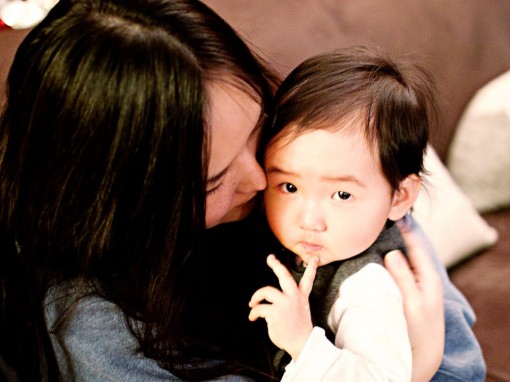
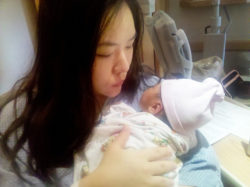
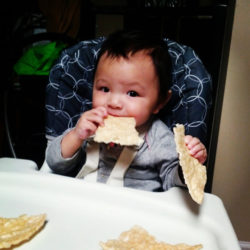
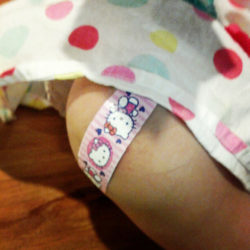
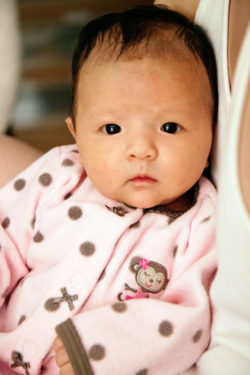

 I like books, gadgets, spicy food, and art. I dislike shopping, hot weather, and the laws of entropy. Although I am a self-proclaimed computer nerd, I still have a love for handbags and makeup... and I am always teetering on high heels. To learn more about me, visit the
I like books, gadgets, spicy food, and art. I dislike shopping, hot weather, and the laws of entropy. Although I am a self-proclaimed computer nerd, I still have a love for handbags and makeup... and I am always teetering on high heels. To learn more about me, visit the 
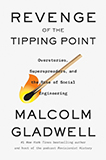

Awww Jenny. *HUGS* The love that you have for your children is really amazing. 🙂 I really, REALLY… miss you guys.
Hmm, interesting. I am not religious so do not have a religious bias one way or the other (I know Calvinism believes in the doctrine of original sin, but many other religions have the opposite belief, that humans are naturally good).
I am not sure what the answer to this question is. I agree with you that even small children frequently have impulses that you might call sinful. Selfishness is the basic state of humanity, and it’s only with a great deal of training and socialization that it is (partly) surmounted.
On the other hand, babies and small children also have many impulses that you could term “good” or “righteous”. For example, humans seem to be born with empathy and concern for others’ feelings (the way babies will cry when hearing another baby cry is a very early expression of this). Scientific experiments have also shown that even babies a few months old can distinguish between helpful and hindering individuals, and prefer the former, even when there is no personal advantage involved (in other words, a kind of morality).
So I am not sure what the fundamental nature of human beings is, but I suspect it is more complex than just “good” or “evil”.
Oh, definitely! I was not saying that all humans are born into this world as evil beings (and sorry if I gave that impression). I agree with you that it’s a lot more complex than just “good” or “evil,” and I think that people are born with varying degrees of good and bad too. What I was trying to say in the post was that when most people picture babies, and when we even look at the phrase “childlike innocence,” we tend to think of babies as pure, untainted beings when it is far from the truth. And my Calvinist beliefs lead me to conclude that while babies SHOULD be pure innocents, they cannot because of original sin.
I’m going to challenge you. Normally, I try not to be too combative, but I recall you’ve read Dawkins and Hitchens, so I won’t hold back:
I find the doctrine of original sin to be the most revolting of Christian dogma. “Created sick–commanded to be well.” If I held a gun to your head and ordered you to fly, you’d probably think than an unreasonable demand, and rightly so. It’s cruel and sadistic and hardly worthy of love and praise, even if I later create a loophole to let you out of it (maybe!). You say you’re explored religion and atheism (I don’t think it’s a coincidence that you’ve settled on the religion you just happen to have been raised in). So why would you believe this? And (given that you do) where do you find the love/grace/glory/etc. in such a system?
Well, not exactly “created sick – commanded to be well.” Originally, it’s more like, created well – commanded to be well – but given free will to choose. The first people created were with no sin, but through their own choice, they brought it into the world. Because of their choice, there were lasting impacts, which still linger today. Just like when I do something, the ramnifications go beyond what I see and impact the people around me and my family, sins permeates throughout and can’t be erased.